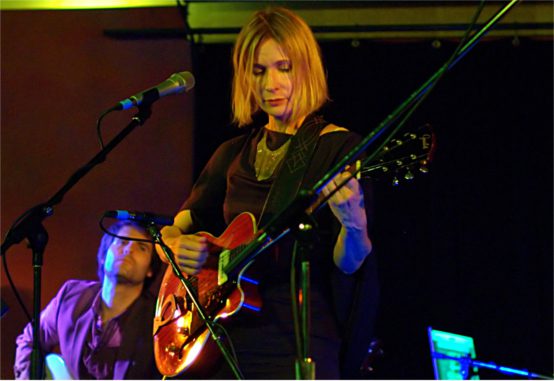Indie Music’s Christ-Haunted Women

I listen to a lot of what you could call “Christ-haunted” music. Your Mountain Goats, your Weakerthans. Not music made by believers necessarily (although sometimes, unexpectedly, yes), but music made by people who can’t quite escape the stories of Scripture and the language of Christian faith. Cain, resurrection, David, sorrow for sin; a desperate rosary or a hospital vespers. You could add to this list stuff I don’t personally quite grok, but which is clearly in the same ramshackle choir loft: Sufjan Stevens, the Hold Steady. You could add Youngest Son, whom I’ve reviewed for TAC.
But I realized recently that I couldn’t think of any women who work that weedy hallowed ground. Women who pray with their voices cracking, who kneel when they’re angry and offer praise when they’re in pain—whose personal relationship with Jesus is fraught. Where were they?
I eventually came up with Sinead O’Connor. I’m glad O’Connor’s voice is out there, though she is not really my thing. There’s also Evanescence, maybe, bless Amy Lee’s teenage heart. They’re vague and bombastic enough to score superhero films and they turn that evangelical “Jesus is my boyfriend” thing into “Jesus is my ex who I have constant Facebook drama with,” and I’ll be honest, I love it. But I felt like I… uh, I felt like this guy.
I asked around, and got a terrific list of suggestions; I’m sharing my favorites with you here. A lot of these were suggested by Youngest Son’s Steve Slagg; others came from various denizens of the twittering world. You know that the comments box is ready for your additions.
Iris DeMent: Yowly country music in the grand tradition. For the purposes of this article let’s start with “The Night I Learned How Not to Pray.”
Jennifer Knapp: I admit until now I only knew her as “that Christian singer who came out.” I loved “Remedy” and generally dig her rawer songs, although she can get a bit sugary and a bit anthemic for my taste. (Did I really just say that after linking to U2? Consistency is for atheists….)
Sam Phillips: Slagg says, “Lots of faith-influenced cultural criticism, as well as insider critiques of the church, in her 80s and 90s acid-pop albums, especially Martinis & Bikinis. Then in the 2000s she started writing weird, poetic folk-pop songs with an odd sort of spiritual mysticism that reminds me of the more recent Bill Callahan albums. There’s a real personal element there too, since she was working through a divorce and getting basically kicked out of Christian music in the 80s, etc.”
Both styles spoke to me; here’s a track from 1991 and a terrifically haunting one from her more recent style.
Judee Sill: A hazy, haunting ’70s singer, heartfelt and askew.
Slagg called her “practically a [Mountain Goats] character, an addict/mystic/misfit/doubter/end-times fanatic. …She really was a true believer, though her spiritual appetites went into the occult and new age as well as Christianity, and there is definitely a pilgrim/searching quality to her work as well. The conflict in her songs comes less from doubt and more from trying to survive in a world inhospitable to the type of devotion that her beliefs and passions required of her.”
He suggested “The Donor” and “The Kiss“; I’d add “Jesus Was a Crossmaker.”
Nina Simone: Another Slagg pick and a great catch. He says he thought of her “more because of her choices of rep and the darkness and interior conflict she brought out in certain songs (Sinnerman, Nobody’s Fault But Mine) than for her original material. And her mashup between George Harrison’s ‘My Sweet Lord’ and David Nelson’s ‘Today is a Killer’ somehow encompasses the whole range between jubilant worship and misotheism.”
Torres: Fierce and angsty; a voice that can shimmer or shriek, with lyrics to match either mode. Check her out especially if you come from that Southern evangelical world. Here’s a blunt object.
If I had to come up with some grand theory about these women and their work, I guess I could say that they tend to express criticism of the Church a lot more frequently and openly than similarly Christ-haunted guys. Sam Phillips’s line, “I need God / Not the political church,” is the kind of thing I mean. My instinct is to say that the men tend to sing about churches for outcasts—the Church of Misfit Toys—whereas the women sing about searching for that church and finding something different, and worse.
The need for rescue is there but the rescuing hands too often bruise as they clutch. These singers have found no sanctuary on earth.
Eve Tushnet is a TAC contributing editor, blogs at Patheos.com, and is the author of the recently-released book Gay and Catholic: Accepting My Sexuality, Finding Community, Living My Faith.
Comments